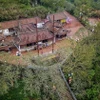Hanoi (VNS/VNA) - The Ministry of Health (MoH) is considering proposing including a dengue vaccine in the expanded immunisation programme, offering it free of charge to the public.
According to statistics from the ministry’s Department of Preventive Medicine, as of the end of September 2024, approximately 80,000 cases of dengue fever and 12 deaths have been recorded nationwide, representing a 15.5% decrease in cases and 14 fewer deaths compared to the same period in 2023.
Vietnam currently has all four dengue virus types circulating, with DENV-1 and DENV-2 being the most prevalent.
In 2023, DENV-2 accounted for 88% of cases, in 2024, DENV-2 accounted for about 70% of those falling ill.
The DENV-2 type is often associated with severe cases of dengue and outbreaks, being a major cause of dengue-related deaths.
Health experts note that a person can contract dengue multiple times in their life, with different virus types and that the risk of severe symptoms may be higher upon subsequent infections.
In Vietnam, a dengue prevention vaccine has been researched and developed to help prevent the disease.
Currently, the Qdenga dengue vaccine is licensed for distribution under Decision 308/QD-QLD dated 14 May 2024 by the Drug Administration of Vietnam and is available as a paid service.
Some domestic and international research on dengue vaccines is also ongoing, aiming to provide additional prevention options for the public.
The dengue vaccine is a new tool in prevention, aiming to reduce cases and limit severe cases requiring hospitalisation or resulting in death, contributing to the overarching goal of protecting, caring for and improving public health.
The Department of Preventive Medicine said that incorporating the dengue vaccine into the expanded immunisation programme must follow the Law on Infectious Disease Prevention and Control, which requires adding the vaccine-preventable infectious disease to the immunisation programme and ensuring free access for the public.
Additionally, including it in the expanded immunisation programme will require evaluating the disease burden, safety, immune efficacy, public acceptance and cost-effectiveness of the dengue vaccine.
The ministry is working with agencies to evaluate these factors, after which it will submit a proposal to the government if suitable, aiming to offer the vaccine free of charge.
According to epidemiologists, in the past, dengue outbreaks in Vietnam typically peaked during the rainy season, from June to November each year.
However, health facilities have recently recorded dengue cases throughout the year, including life-threatening cases.
Moreover, while outbreaks previously concentrated in the central and southern regions, dengue is now increasingly being reported in the northern regions.
This situation indicates the need to increase resources and introduce proactive dengue prevention measures, such as vaccination when a vaccine is available.
The World Health Organization (WHO) estimates that around four billion people worldwide are at risk of contracting arboviruses (viruses transmitted through arthropods) and this figure is expected to rise to five billion by 2050. Dengue cases have surged across all six WHO regions, with cases doubling each year since 2021. As of the end of August 2024, there were over 12.3 million cases worldwide, nearly double the 6.5 million cases reported for all of 2023.
Dengue fever is endemic in tropical and subtropical climates, particularly in Southeast Asia, the Western Pacific, the Americas and increasingly in Africa.
Therefore, WHO has launched the Global Arbovirus Preparedness and Response Plan (SPRP) to address dengue fever and other arbovirus diseases transmitted by Aedes mosquitoes. By promoting a coordinated global response, the plan aims to reduce the burden of illness and mortality from dengue and other arbovirus diseases, such as Zika and Chikungunya, which are also transmitted by Aedes mosquitoes./.

See more
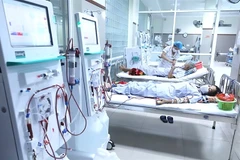
Vietnam sees alarming surge in diabetes cases, over half undiagnosed
An estimated 7 million Vietnamese are currently living with diabetes, but about 50% remain undiagnosed, a dangerous gap that is fuelling serious, preventable complications and increasing the burden on the healthcare system.
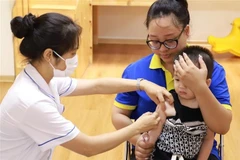
WHO, UNICEF commend Vietnam’s progress in childhood immunisation
In 2024, Vietnam achieved 99% coverage for the first dose of the diphtheria, tetanus and pertussis vaccine, up from 80% in 2023. Immunisation coverage in the country has not only rebounded to the high levels seen before the COVID-19 pandemic but has now surpassed the rates recorded in 2019.
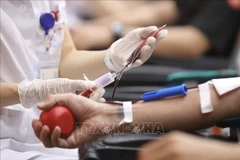
Hanoi blood donation campaign sets to collect 4,000 units of blood
The organisers hope the drive will help boost emergency and treatment blood supplies during summer—a time when donations often decline sharply.
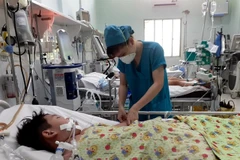
HCM City reports six dengue deaths, raises outbreak alert
Health authorities in HCM City have issued an urgent alert after six people died from dengue fever, amid a spike in infections driven by the onset of the rainy season.
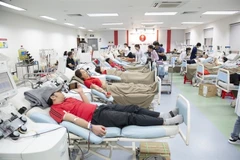
Health sector calls on people to donate blood
During the peak months of July and August 2025, the National Institute of Haematology and Blood Transfusion (NIHBT) needs at least 90,000 units of blood to supply 180 hospitals in the northern region. However, despite continuous efforts, the reserve blood is still short of 30,000 units.
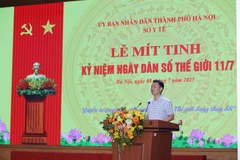
Hanoi celebrates World Population Day
The Hanoi ceremony highlighted efforts to ensure all citizens, especially women and youth, can access accurate information and healthcare services to make informed reproductive choices.
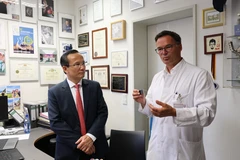
Vietnam, Germany forge cardiovascular partnership
Currently, cardiovascular specialists from the 108 Military Central Hospital are working alongside a team of Prof.Dr. Jan D. Schmitto, Deputy Director of MHH’s Department of Cardiac, Thoracic, Transplantation and Vascular Surgery on clinical trials for MCS devices, implanted in heart failure patients either as a bridge to transplantation or as permanent treatment.
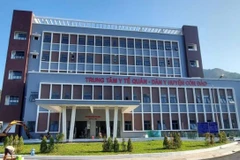
HCM City seeks to build general hospital on Con Dao Island
The centre not only serves residents living on the island, but also receives tens of thousands of visitors every year, according to Assoc Prof Dr Tang Chi Thuong, Director of the HCM CIty Department of Health.
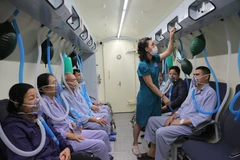
Vietnam – attractive destination for medical tourism
Not only does Vietnam attract international tourists with its landscapes, culture, and cuisine, but it is also gradually becoming a reliable destination for medical treatment, offering high-quality services at reasonable costs.
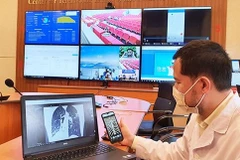
Vietnam looks to expand telehealth to improve access for remote communities
Over the past six months, 150 communal health stations in provinces including Ha Giang, Bac Kan, Lang Son, Lao Cai, Lai Chau, Yen Bai, Tay Ninh, Hau Giang, Ben Tre and Ca Mau have been equipped with information technology systems. In addition, 117 key provincial healthcare workers have received training, with thousands more expected to follow.
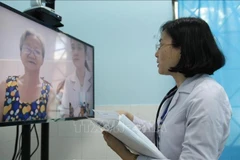
Vietnam, RoK strengthen cooperation in telemedicine
During the COVID-19 pandemic in 2020, the Ministry of Health swiftly launched a telemedicine programme, connecting more than 1,000 medical establishments nationwide. The model, which remains in operation, has benefited tens of thousands of patients, including foreign nationals.

HCM City doctors revive Cambodian infected with “flesh-eating” bacteria
After more than three weeks of intensive treatment, the patient's pneumonia improved, breathing stabilised, sedation was reduced, and the breathing tube was removed. He is now conscious, able to eat orally, and in recovery.
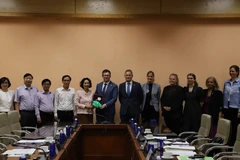
Vietnam, Denmark launch phase 3 of strategic health sector partnership
Vietnam is currently reshaping its grassroots healthcare system to better serve a rapidly ageing population, address changing disease burdens, and meet rising public expectations fuelled by economic growth.

Vietnam joins 110 countries in taxing to raise unhealthy products’ prices
The press awards on non-communicable disease prevention, launched on April 28, received enthusiastic participation from journalists across various media outlets, with over 120 entries submitted.
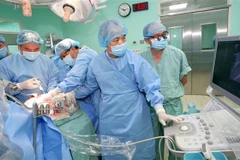
Hue Central Hospital successfully performs four simultaneous organ transplants
Despite storm-related disruptions and flight delays, the organs were successfully transported via a combination of air and ground travel. All patients are currently stable and recovering well.
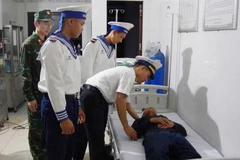
Injured fisherman in Truong Sa receives timely medical operation
The patient, Tieu Viet But, born in 1970 and residing in Binh Tri commune, Binh Son district, the central province of Quang Ngai, was working aboard fishing vessel Qng – 95657TS when the incident occurred at 7:00 am.
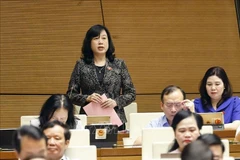
No counterfeit drugs in hospitals: Health Minister
All drugs entering hospitals must have a clear origin, so counterfeit drugs are only in the market, not in hospital, affirmed Minister of Health Dao Hong Lan.

Brain-dead man's organs save seven lives in Vietnam
Thong Nhat Hospital in Ho Chi Minh City announced on June 16 that the transplants were successfully performed using the man’s donated organs.

Vietnamese hospital seeks stronger ties with British partners
A surgical training centre based on the RCS model will be set up at 108 Military Central Hospital (Hospital 108) in Hanoi.

Forum spotlights AI and digital innovation in healthcare
To achieve its goal of becoming a developed nation by 2045, Vietnam is prioritising the integration of AI and digital tools into the training of future doctors, said Assoc. Prof. Dr. Nguyen Viet Nhung, Dean of Medicine at University of Medicine and Pharmacy, Vietnam National University (VNU) Hanoi.





